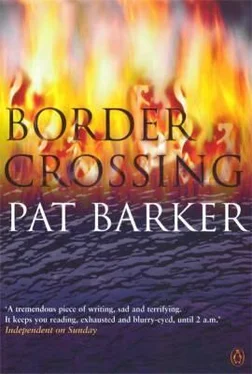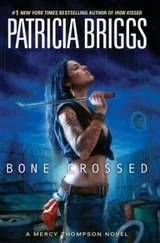She looked at her watch. ‘And I’d better get me skates on. I promised I’d be there in time for a final fitting.’
‘Are you driving?’
‘Of course. I might need to get back early.’
They said goodbye on the doorstep. Martha turned up her collar against the wind and rain.
‘Get your priorities right, Martha.’
‘I know, I know. Enjoy myself.’
‘No. Catch the bloody bouquet!’
‘Oh, you still advocate marriage, do you?’
He smiled. ‘Ye-es.’
She reached up and kissed his cheek. ‘Bye, Tom. See you when I get back.’
The phone rang at intervals throughout the afternoon. After calling his mother and his secretary to explain the situation, Tom left the answering machine on, and closed the kitchen door so he didn’t have to hear the messages. He spent three hours rearranging the furniture to make the living room look less bare. He brought a table and two chairs down from the spare bedroom, and some paintings down from the loft. Then he decided it was cold enough, certainly wet enough, to justify lighting a fire. The coal was damp, and spat and smoked miserably, but he persevered and managed to coax it into flame. When it was going to his satisfaction, he poured himself a drink. Probably he should have made himself something to eat, but that meant the kitchen, and the kitchen meant the answering machine, so he decided not to bother.
With the fire lit and the lamps on, the living room looked less desolate than he would have believed possible a few hours ago. It still sounded hollow, and the way the furniture clustered round the hearth was a little too reminiscent of a campfire, but he was aware, as he looked around him, of a shiver of excitement, barely distinguishable from fear. He was free. Perhaps he ought to go away for a few days, sort out what he felt, but he was conscious of a countervailing desire to go to ground, to pull the tattered remnants of his life around him. Keep out the cold. And meanwhile, only an hour or so away, there was Danny, whose problems dwarfed his own.
He switched on the news. The Kelsey murder was the second item. Close-ups of flowers left at the scene of the crime, blow2y chrysanthemums, ‘Love’ in blue ink dribbling down a wet card. Then pictures of a white van accelerating rapidly, pursued by angry crowds.
The doorbell rang. Danny. Tom walked through his hollow house, his footsteps, even his breathing, sounding different inside the changed space, and let him in.
‘Did you get Martha?’ Danny asked.
‘Yes, she came round.’
‘Do you know she’s going away tonight?’
‘Yes.’
‘I don’t know why she can’t cancel.’
‘It’s a wedding. She’s the bridesmaid.’
‘She ought to’ ve seen this coming.’
‘I don’t see how she could have done. The boys were only charged yesterday. Anyway, come through.’
‘Did you see the news?’ Danny asked, following him into the consulting room.
‘Yes. They didn’t mention you this time.’
‘They’re on to me, though. I’m sure I was followed.’
He found it difficult to settle, rubbing the backs of his hands, wriggling in the chair. There was no way of knowing whether his conviction that he was being followed was paranoid or not. It could be true.
‘By the way,’ Tom said, settling down into his chair, ‘I went to see Angus MacDonald.’
Danny said nothing at all, just stared at him blankly.
‘He asked me to give you his address.’
Tom scribbled Scarsdale Writers’ Centre and the address on the back of an envelope, and handed it to Danny, who took it, looked at it and put it in his pocket, all without saying anything. He seemed too dazed to take it in.
‘Look,’ Tom said, ‘shall we take things a bit easy this time?’
Danny was already shaking his head. ‘No, now or never.’
He was reaching for his cigarettes as he spoke. Tom sensed anew tension in him, a new purpose. Familiar sounds — the creak of a chair, the popping of the gas fire; familiar smells — furniture polish, wet wool, the smoke on Danny’s clothes and hair; familiar sights — the circle of reddish light on the desk, Danny’s left forefinger picking at a torn cuticle.
‘Lizzie,’ Danny said.
‘Don’t rush.’
Tom sat back, waited, let the silence re-create the space around them. Danny was tapping his cigarette, planning, Tom thought, the shortest route. The atmosphere was different tonight. Partly because Danny was desperate, trying to dismiss the threat of newspaper intrusion from his mind, but partly too because Tom’s recent conversation with Angus had alerted him to the possibility that Danny might be lying. Might be. Tom wasn’t sure, now, which of them he believed. Angus had his own reasons to lie.
Curiously, as if reading his thoughts, Danny began talking about Angus. ‘When I was at Long Garth I invented a twin. I told everybody I was a twin, and that the other one had died. I think it was… well, it’s obvious what it was, but nobody said, “No, you’re not. You never had a twin.” Because the past didn’t matter. Angus was the only person who said: “No, sorry, Danny. No twin. Just you.”‘ He laughed. ‘And that was actually quite a sharp jerk on the leash. Suddenly there was this objective truth, and I couldn’t get round it. He wouldn’t let me.’
Did you ever talk to Angus about Lizzie? I don’t mean the murder
‘Wrote. Not talked.’
‘Do you think you could try now?’
A deep drag on the cigarette, flared nostrils, he looked like an athlete contemplating a jump he probably wouldn’t make.
‘She was an old lady,’ he said at last, with a sigh. ‘I know it sounds odd when I call her Lizzie, like, you know, sort of disrespectful, but we all called her that. She was a local character, always the same coat, the same shopping bag. She had these very thick lenses in her glasses, because she’d had cataracts. My mother always used to stop and talk to her, and one of the things you noticed was that she couldn’t have a conversation without her lips moving while the other person spoke. You know, as if she was trying to speak for them. Somebody must have made her self-conscious about it, because she had a habit of putting a hand up to her mouth and trying to hold her lips still. Very thin, pleated upper lip. False teeth, too even, but yellow, age spots on her hands, a wedding ring, swollen knuckles. I remember looking at the ring and wondering how she got it off her finger. It was marooned, you know, very loose, but stranded by the swollen knuckle.’
Tom was remembering a photograph of Lizzie’s left hand, a close-up of the injuries inflicted when the murderer had tried to wrench the ring off.
‘She had huge pupils, they didn’t change in size, they didn’t respond to the light, and she used to bend down and ask me questions about school, and her breath smelt of peppermints. Oh, and the bag smelt offish. It was an old canvas shopping bag, and it used to swing from side to side and hit her on the leg.’
‘How old did you think she was?’
‘She was seventy-eight.’
‘No. How old did you think she was?’
‘Oh ancient. Ancient.’
‘What sort of person was she?’
‘Lonely old lady, widow, lived by herself, kept cats, befriended strays, there was always room for another. She was very protective of the cats. Once Paul and me — a kid I used to go to school with — were playing with one of the kittens, and she came running out to chase us away. She just assumed we were teasing it.’
‘And were you?’
‘No.’ A pause. ‘I suppose the short answer is, I don’t know what sort of person she was. Because “lonely old lady, kept cats” is just a stereotype, isn’t it? She could’ve been anything.’
Читать дальше












